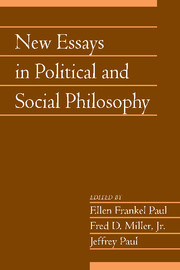Book contents
- Frontmatter
- Contents
- Introduction
- Acknowledgments
- Contributors
- Political Liberty: Who Needs It?
- State Coercion and Force
- Political Legitimacy and Economic Liberty
- Who Owns What? Some Reflections on the Foundation of Political Philosophy
- Human Reproductive Interests: Puzzles at the Periphery of the Property Paradigm
- Why Free Trade is Required by Justice
- Structural Exploitation
- Rescuing Justice from Equality
- Reinterpreting Rawls's The Law of Peoples
- Responsible Choices, Desert-Based Legal Institutions, and the Challenges of Contemporary Neuroscience
- Genocide and Crimes Against Humanity: Dispelling Some of the Conceptual Fog
- Harm and the Volenti Principle
- Education and the Modern State
- Index
Genocide and Crimes Against Humanity: Dispelling Some of the Conceptual Fog
- Frontmatter
- Contents
- Introduction
- Acknowledgments
- Contributors
- Political Liberty: Who Needs It?
- State Coercion and Force
- Political Legitimacy and Economic Liberty
- Who Owns What? Some Reflections on the Foundation of Political Philosophy
- Human Reproductive Interests: Puzzles at the Periphery of the Property Paradigm
- Why Free Trade is Required by Justice
- Structural Exploitation
- Rescuing Justice from Equality
- Reinterpreting Rawls's The Law of Peoples
- Responsible Choices, Desert-Based Legal Institutions, and the Challenges of Contemporary Neuroscience
- Genocide and Crimes Against Humanity: Dispelling Some of the Conceptual Fog
- Harm and the Volenti Principle
- Education and the Modern State
- Index
Summary
Introduction
The unconditional defeat of Nazi Germany, with its egregious doctrine of racial superiority and its unspeakable policies of extermination and enslavement, had a profound influence on postwar law and moral thought. The legal documents through which the Allies sought to articulate the values and to establish the institutions of a new international framework explicitly affirmed the moral principle that all humans possess equal and inherent dignity. Thus, the Charter of the United Nations stated that among the purposes of the organization were “promoting and encouraging respect for human rights and for fundamental freedoms for all without distinction as to race, sex, language, or religion.” And the Universal Declaration of Human Rights declared that “recognition of the inherent dignity and of the equal and inalienable rights of all members of the human family is the foundation of freedom, justice and peace in the world.”
The principles of human dignity and equality are extremely abstract, and various specifications of them are found in the international human rights agreements that came into force in the decades after the war. But developments in international criminal law also helped to specify and implement the principles by explicitly defining two crimes: genocide and crimes against humanity. Genocide was defined by a postwar international convention in terms of certain acts “committed with intent to destroy, in whole or in part, a national, ethnical, racial or religious group, as such.”
- Type
- Chapter
- Information
- New Essays in Political and Social Philosophy , pp. 280 - 308Publisher: Cambridge University PressPrint publication year: 2013



